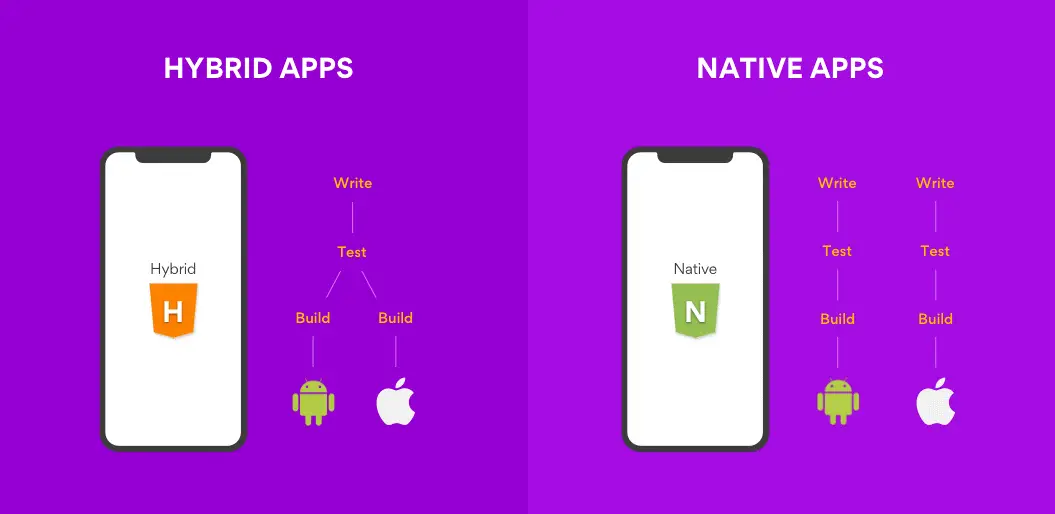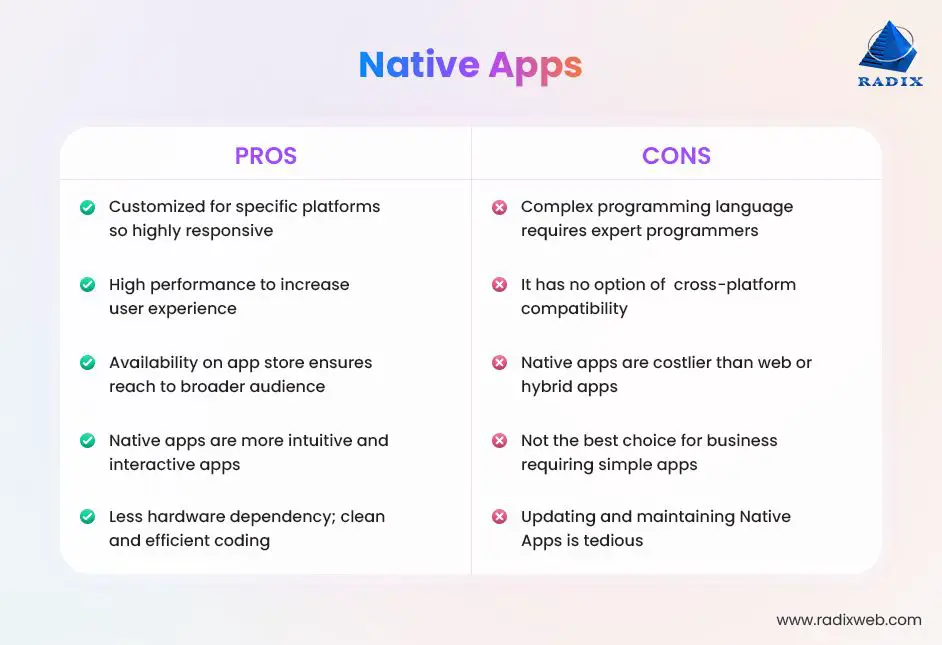Native Apps

Native apps are developed specifically for a particular platform, such as iOS or Android. This means that they can take advantage of the full range of features and capabilities that the platform offers. Native apps are typically written in the platform’s native language, which allows them to achieve high performance and responsiveness. However, native apps can be more expensive to develop and maintain than hybrid or web apps.

Hybrid Apps

Hybrid apps are a combination of native and web technologies. They are developed using web technologies, such as HTML5, CSS, and JavaScript, and then wrapped in a native container. This allows them to be deployed on multiple platforms without having to be rewritten for each one. Hybrid apps are typically less expensive to develop and maintain than native apps, but they may not offer the same level of performance and responsiveness.
Web Apps
Web apps are developed using web technologies and are accessed through a web browser. They are not installed on the device, so they can be used on any device that has a web browser. Web apps are typically the most cost-effective option to develop, but they may not offer the same level of performance and responsiveness as native or hybrid apps.
Which type of app is right for you?
The best type of app for you will depend on your specific needs and requirements. If you need an app that offers high performance and responsiveness and can take advantage of the full range of features and capabilities of a particular platform, then a native app is the best option. If you need an app that can be deployed on multiple platforms without having to be rewritten for each one, then a hybrid app is the best option. If you need an app that is cost-effective to develop and maintain, then a web app is the best option.## Building Mobile Apps: Native Vs. Hybrid Vs. Web
Executive Summary
Developing a mobile application can enhance user engagement, customer loyalty, and brand visibility. However, the choice between native, hybrid, and web apps can be pivotal, impacting performance, cost, and developer accessibility. This comprehensive guide meticulously examines each approach, empowering decision-makers to select the optimal solution for their specific objectives.
Introduction
The proliferation of smartphones and tablets has transformed mobile applications into indispensable tools for businesses and individuals alike. Understanding the nuances of native, hybrid, and web apps is paramount for making an informed decision when embarking on mobile app development.
Native Apps
Native apps are developed specifically for a particular operating system (OS), such as iOS or Android. They leverage device-specific features like the camera, GPS, and accelerometer, providing a seamless user experience and optimal performance.
- Platform-specific SDKs: Provides access to device-specific hardware and software capabilities.
- Optimized performance: Tailored to the underlying OS, ensuring smooth operation and responsiveness.
- App Store distribution: Published and distributed through official app stores, meeting stringent quality and security standards.
- High development cost: Requires specialized developers for each target OS, increasing project expenses.
- Limited cross-platform compatibility: Restricted to a single OS, limiting user reach to specific devices.
Hybrid Apps
Hybrid apps combine elements of native and web apps, offering a balance between device integration and cross-platform compatibility. They employ web technologies like HTML5, CSS, and JavaScript but can interact with device features through plugins or APIs.
- Cross-platform development: Utilize the same codebase for multiple platforms, reducing development time and costs.
- Device access: Integrate with device functionalities through plugins or APIs, providing a near-native experience.
- Performance trade-offs: May compromise performance compared to native apps due to reliance on web technologies.
- Potential security vulnerabilities: Plugins or APIs may introduce security risks if not properly implemented.
- App Store limitations: Hybrid apps may face restrictions or limitations when submitted to app stores.
Web Apps
Web apps are websites designed to provide app-like functionality within a mobile browser. They offer cross-platform accessibility without the need for installation or distribution through app stores.
- Cross-platform compatibility: Accessible from any device with an internet connection, maximizing user reach.
- No app store fees: Avoids the costs associated with app store distribution and updates.
- Limited device integration: Restricted access to device-specific hardware or software features.
- Performance constraints: May suffer from performance issues due to reliance on the underlying browser and network connectivity.
- Installation not required: Eliminates the need for users to install or update the app, simplifying user adoption.
Conclusion
The choice between native, hybrid, and web apps hinges on the specific requirements and constraints of the project. Native apps excel in performance, device integration, and user experience, but come with higher development costs and limited cross-platform compatibility. Hybrid apps offer a compromise between platform specificity and cross-platform reach, but may experience performance trade-offs. Web apps provide maximum accessibility and lower maintenance costs, but have limitations in device integration and performance. By carefully evaluating these factors, decision-makers can select the optimal approach for their mobile app development endeavors.
Keyword Phrase Tags
- Mobile app development
- Native apps
- Hybrid apps
- Web apps
- Cross-platform compatibility

Great article. Thanks for sharing.
This article could’ve been better if it had more details about the pros and cons of hybrid apps.
Can you please add more information about the performance of web apps compared to other app types?
I disagree with the author’s point about native apps being the best choice for all use cases.
Ironic, isn’t it? An article about mobile apps, yet it’s written in a way that’s hard to read on a mobile device.
Oh wow, another article about mobile apps. How original.
I’m picturing a hybrid app as a donkey: not as fast as a horse, but not as stubborn as a mule.
Here’s a useful tip: if you’re developing an app for a specific platform, use a native app. If you need your app to work across multiple platforms, consider a web or hybrid app.
I’m not convinced that making a decision between the three app types is as simple as the author makes it seem.
This article is amazing! I’ve been wanting to learn more about the differences between native, hybrid, and web apps.
I wonder if there will be another type of app that will come along and make these three obsolete.
I’m always hesitant to try new things, but maybe it’s time to give hybrid apps a try.